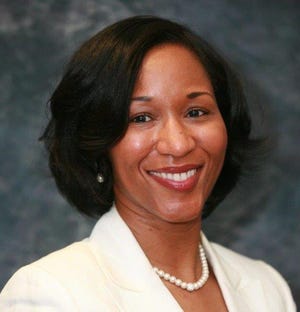GOP senator blasts Michigan nominee's views on religious freedom
 Melissa Nann Burke
Melissa Nann Burke
Washington — A Republican senator on Wednesday raised questions about a Michigan court nominee's views on religious freedom and the First Amendment, saying he was "shocked" by what he called the nominee's "anti-religious animus."
At a hearing, freshman Sen. Josh Hawley, R-Missouri, asked Kalamazoo attorney Michael Bogren about his representation of East Lansing. That city was sued after declining to lease a stall at its farmers market to a farm that refused to host same-sex weddings on its premises.
Bogren was nominated by President Donald Trump in March to fill one of two vacancies on the federal bench in Michigan.
The plaintiffs, Country Mill Farms LLC and owner Steve Tennes, alleged in a lawsuit that the city could not refuse to allow them to participate in the farmers' market because their religious beliefs did not permit them to rent their premises for same-sex weddings.
"You compared in your briefs a Catholic family's adherence to the teachings of their church to the activities of the KKK and the teachings of radical imams. Do you stand by those statements?" Hawley asked Bogren, who is nominated to sit on the U.S. District Court for the Western District of Michigan.
"Senator, respectfully, that is not what I said," Bogren replied.
Bogren said his point was that citing religious beliefs to justify discrimination based on sexual orientation could be used to try to justify another sort of discrimination, such as gender or race.
Hawley, a member of the Senate Judiciary Committee, disagreed.
"No, you specifically compare this Catholic family's adherence to their religious beliefs with the views of the KKK, saying that they would be entitled to the same thing," Hawley said.
"I don't mean to quibble, senator, but I was trying to make a point about what the next step would be and how one would have to — not be able to draw a principled distinction," Bogren said.
Hawley continued: "So you think those things are equivalent? You think that the Catholic family's pointing to the teachings of their church is equivalent to a KKK member invoking Christianity?"
Bogren said, "From a legal perspective, there’s no distinction."
The city of East Lansing had informed the farm owners that because its business practices discriminated on the basis of sexual orientation, the city could not lease a stall to them at the farmers' market.
The city requires its vendors to comply with its civil rights ordinance, which includes sexual orientation as a protected class, Bogren explained.
Hawley, the former attorney general of Missouri, raised last year's Supreme Court ruling in Masterpiece Cakeshop v. Colorado Civil Rights Commission, in which the justices found in favor of a baker who refused to sell a cake to a same-sex couple.
Then-Justice Anthony Kennedy viewed certain statements by state commissioners in the case to be anti-religious bias and "hostility" to religion that Kennedy compared to “defenses of slavery and the Holocaust.”
"Your language comparing a Catholic family's beliefs to the KKK and to the teachings of radical Islam seems to me to the exactly on point with what Justice Kennedy's saying here. Don't you think that's the problem?" Hawley said.
"Senator, respectfully, I represent clients, not causes," Bogren said.
Hawley continued to press his point: "You can clear this up here today. Why don't you go on the record right now and say that this kind of rhetoric demonstrating anti-religious animus is wrong, and you disagree with it?"
Bogren, standing by his comments, said, "I don't believe that's what it is."
"I think that that raises a question whether you can faithfully apply the Masterpiece Cakeshop ruling, and Justice Kennedy is talking about people like you in that case. Is he not?" Hawley said.
"I don't believe he is," Bogren said. "Under my role as an advocate, it's different than what my role would be as —"
"But you just affirmed that this is what you think," Hawley said.
"That was as an advocate," Bogren said.
Hawley said Bogren was questioning the sincerity of the plaintiffs' faith. Bogren disagreed.
"All I can tell you is I am shocked by the statements that I read in your briefs. I am shocked by this kind of language," Hawley said.
"I'm particularly shocked by it the light of the Supreme Court's clear teaching that this kind of animus and these kind of hateful comparisons are out of step with protections of our law and are not permissible."
Bogren declined to comment on the exchange after the hearing concluded.
Hawley said he's leaning toward voting no on Bogren's nomination, saying his views are "troubling" and "offensive."
"I'm certainly open to hearing new information, but I wasn't very happy with what I heard today. His position is really incredible. And he didn't do himself any favors with his responses today, so I was really disappointed," Hawley said in an interview.
"He was all over the map, but he basically would not acknowledge that he saw any issue with his statements, which are exactly what a majority of the United States Supreme Court has said government officials cannot engage in," Hawley added.
Asked if Bogren could say anything to change his mind, Hawley replied, "He could say he was wrong, that he regrets saying those things — regrets the animus."
"To compare a Catholic family, following the teachings of their church, as akin to white supremacists and radical imams who want to strip women of all rights, I mean, that's just ridiculous. It's beyond ridiculous. It's offensive," Hawley said.
The heated episode was an exception in an otherwise tame proceeding before the Senate Judiciary Committee for five district court judges.
Other Republican senators, Chairman Lindsey Graham of South Carolina and John Kennedy of Louisiana, followed up with Bogren about the East Lansing case, which is still pending in the Western District court.
"I understood his explanation," Graham said of Bogren after the hearing. "I'll look at his assertions to the court, but I understood where he was coming from."
Graham said he doesn't believe Bogren's nomination is in jeopardy of failing. "Not based on what I've heard," he said.
Carl Tobias, who studies the judicial selection process at the University of Richmond School of Law, called the Hawley-Bogren exchange "brutal."
"Hawley seemed to not be listening. I thought that Bogren handled it as well as could be expected," Tobias said.
Whether Bogren can advance out of committee "depends on how much Hawley follows up and can persuade his GOP colleagues to oppose. I though he was doing fine before that."
Bogren, 61, primarily defends governmental entities and officials named in civil litigation, focusing on civil rights and constitutional law.
He recently represented a housing association in northern Michigan that prohibited non-Christians from buying a home there.
The Bay View Association, northeast of Petoskey, was sued in 2017 in federal court to overturn the rule, which residents voted to eliminate last year.
The committee also heard Wednesday from U.S. Magistrate Judge Stephanie Dawkins Davis of Farmington Hills, a former federal prosecutor who was nominated to sit on the U.S. District Court for the Eastern District of Michigan.
Davis, a native of Kansas City, Kansas, was the first African-American woman nominated by Trump to be a judge.

Both she and Bogren were introduced to the committee by Sen. Gary Peters, D-Bloomfield Township.
Peters said Bogren once convinced his high-school literature teacher to stage a mock trial for Hamlet. Bogren represented the "tortured prince," who was acquitted of murdering his Uncle Claudius, pleading temporary insanity, Peters said.
"This was the first of his many, many legal successes," Peters said.
Peters also told a story of Davis' kindergarten teacher who reported that she saw the back of her head more than her face “because she was constantly turning around to litigate disputes between her classmates."
"I wish I could say that as a girl growing up in Kansas I foresaw my appearance here today. But the truth is, I did not," Davis told the senators.
"I established a theme in my chambers back in Michigan to capture the pride and all that I feel serving as a judicial officer in this great country. That theme is 'Only in America.'"
The nominations of Davis and Bogren followed months of negotiations between the White House and U.S. Sens. Debbie Stabenow, D-Lansing, and Peters.
Both senators returned "blue slips" for Davis and Bogren, meaning the home-state senators don't object to the picks.
Davis was appointed a magistrate judge in January 2016 and assigned to the Flint federal courthouse.
One of her most high-profile cases involved arraigning Amor Ftouhi in the 2017 terrorism and stabbing attack at Bishop International Airport. Ftouhi was later convicted and faces up to life in prison.
Davis in her committee questionnaire said as a judge she has presided over 16 civil cases that have gone to judgment, including racketeering, computer fraud and food-stamp fraud cases, as well as a prisoner civil rights cases involving Muslim inmates.
One group of inmates claimed they were denied a balanced diet with sufficient calories during the month they were observing Ramadan. Davis said she conducted a settlement conference and the case was resolved without going to trial.
Davis, 52, started at the U.S. Attorney’s Office in Detroit in 1997 and was later appointed by U.S. Attorney Barbara McQuade as her executive assistant U.S. attorney in 2010.
Peters said she had gained the admiration of her colleagues in the U.S Attorney's Office as a member of The Supremes — a musical trio of attorneys who performed at going-away and office holiday parties.
Davis was a young student in Kansas when she became interested in the law because of the landmark case Brown v. Board of Education, which in 1954 declared racial segregation of children in public schools unconstitutional, Peters said.
When asked Wednesday, she told Sen. Richard Blumenthal, D-Connecticut, that Brown was rightly decided.
Davis graduated from Wichita State University in 1989 and Washington University School of Law in St. Louis in 1992.
Davis was joined in the hearing room Wednesday by husband Grant Davis and children Kienuwa, Maya and Gyasi Davis. Her mother and stepfather, Earline and Ronald, were watching remotely from Kansas City, Peters said.
Until Davis, Trump had nominated no African-American women to the federal bench, Tobias said. Since then, Trump has also nominated Ada Brown, an African-American woman, for the U.S. District Court in Dallas.
Bogren was raised in Parchment, one of four children, "on factory workers' wages," he told the committee.
His parents "always believed in the American dream and taught us that with dedication, a strong work ethic and education, we could accomplish anything," Bogren said.
He now lives in Hastings, and some of his family from Michigan attended Wednesday's hearing, including his sister Nancy Strzynski, who is also an attorney, and children Charles and Rebecca Bogren.
In his committee questionnaire, Bogren said neither Strzynski, a special assistant U.S. Attorney in Michigan's Western District, nor his son Charles, an attorney at the firm Kreis, Enderle Hudgins & Borsos in Portage, could appear before him in any case.
He started with the firm Plunkett Cooney in 1985 and now serves as chairman of the firm’s board of directors and as managing partner of the firm’s Kalamazoo office.
Bogren graduated from Western Michigan University in 1979, majoring in English literature and linguistics, and from the University of Detroit School of Law in 1982.
mburke@detroitnews.com